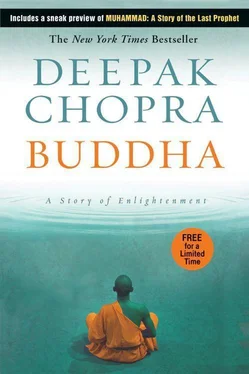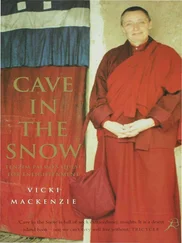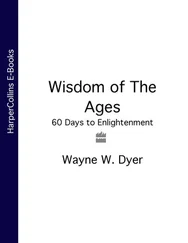But in the mountains Asita could find a bedrock of silence. Sitting in that enveloping emptiness, he could direct his mind, as clean as the flight of an arrow, to any object or place. It was really the mind that went to the demon loka, but Asita had such one-pointed clarity that he could travel with it.
And so it came about that the demon king Mara found himself staring at a most unwelcome intruder. He glared at the naked old man sitting in lotus position before his throne. Nothing like it had happened in a long while.
“Go away,” Mara growled. “Just because you got here doesn’t mean you can’t be destroyed.” The old man didn’t move. His yogic concentration must have been strong, because his lean brown body, as tough as the sinew showing under its skin, grew sharper in outline. Mara would have commanded some lesser demons to torment the intruder, but these hermits weren’t so easily dismissed, so Mara bided his time.
After a moment the old man’s eyes opened. “You do not welcome me?” His voice was mild, but Mara read irony in it.
“No! There’s nothing for you here.” The dead and departed passed through Mara’s hands, but it displeased him to meet mortals under any other circumstances.
“I didn’t come for myself. I came for you,” the old man said. He rose and looked around. The demon loka is a world as varied as the material world, and it has its regions of greater and lesser pain. Since torment did not threaten Asita, he beheld only a dense, noxious fog surrounding him. “I bring you news.”
“I doubt it.” Mara moved restlessly in his seat. As temple paintings often depict him, his throne was made of skulls. His body was red with flames spitting around it, and instead of one horrible face he possessed four, which turned like a weathervane, presenting fear, temptation, disease, and death.
“Someone is coming to meet you. Soon, very soon,” Asita said.
“Millions have met me,” Mara shrugged. “Who are you?”
“I am Asita.” The old hermit stood up and faced Mara directly. “Buddha is coming.” This caused a slight tremor, nothing more, to run through Mara’s body. Asita noticed it. “I knew you would be intrigued.”
“I doubt you know anything.” Mara wasn’t simply being arrogant. To him, Asita was a blank. There was nothing to hold on to, no ground for temptation or fear to stand on. “Who picked you as messenger? You’re deluded.”
Asita ignored this and repeated the word that had made Mara tremble. “Buddha is coming. I hope you’re prepared.”
“Silence!”
Until that moment Mara had paid as much attention to Asita as to a small seasonal famine or an insignificant plague. Now he leaped from his throne and shrank to human size, keeping only one of his four demonic faces, death. “What if he comes? He’ll abandon the world, just as you did. Nothing more.”
“If you believe that, then you have forgotten what Buddha can do,” Asita said calmly.
“Really? Look!” Mara opened his mouth, which was solid blackness behind his fangs. The blackness expanded, and Asita could see the mass of suffering that Mara embodied. He saw a web of souls caught in turmoil, a tangle of war and disease and every version of pain that the demons could devise.
When he felt that the spectacle had had its effect, Mara slowly closed his mouth again, and the darkness receded back inside him. “Buddha?” he said contemptuously. “I’ll make them think that he’s the demon.” The prospect brought a smile.
“Then let me speak as a friend, and I will tell you your fatal weakness,” Asita said. He sat down in lotus position, folding his legs over each other, making the mudra of peace with his thumb and forefinger. “Being the monarch of fear, you’ve forgotten how to be afraid yourself.”
Enraged by this insult, Mara roared and swelled to monstrous size as the hermit suddenly faded away. He could feel the possibility of Buddha like the faintest light before dawn. Still, Mara was blind. He believed humans would ignore yet another pure soul. This was a mistake. The child on the horizon would be noticed because what he stood for was destiny.
The silk curtains to Maya’s chamber parted, and Kumbira rushed out. The only thing she could be grateful for was that no one else knew yet. Her slippers padded quickly, quietly down the corridor. Night had fallen. The seventh day of the full moon was rising after the baby prince’s birth, casting bars of ghostly light onto the polished teak floors of the palace. Kumbira paid no attention.
After dinner Suddhodana had retired to the nursery to be alone with his son. When Kumbira ran in, breathless and speechless, her face wore an expression he had seen only once before, when his father, the old king-
“No!”
The cry sprang from him involuntarily. Horror chased the gladness from his heart and clamped tight bands around his chest.
Sorrowfully, Kumbira drew her sari over her head to mask her face. Tears dripped from her tired eyes.
“What have you monsters done to her?” Suddhodana demanded. He swept past Kumbira, knocking her to the ground with a glancing blow. At the canopied bed, the king tore the drawn sheets away to reveal his wife. Maya looked as if she only slept, but the stillness that claimed her was complete. Suddhodana dropped to his knees and took her hands, whose coolness seemed temporary, the kind he could rub away whenever she felt a chill. Involuntarily he started to rub them now.
Kumbira allowed an hour to pass before she crept into the room with a retinue of court ladies. They were there to console but also to bring dignity. Grief, like everything else surrounding a king, was a matter of ritual. The moment Suddhodana consented to leave, attendants were prepared with ointments, winding sheets, and ceremonial marigolds to adorn the body. The wailing women were on call, and of course a dozen Brahmins with prayers and censers.
“Highness.” With a word, Kumbira brought all this to the king’s attention. Suddhodana looked up blankly. Kumbira waited a moment to see if she would have to repeat herself. As he gently placed Maya’s arm across her chest, Suddhodana shuddered. It wasn’t just that his wife had often slept that way, one arm folded across herself, the other across him. It was also that the king felt a slight stiffness creeping into Maya’s limbs. Touch being the sense most cherished by lovers, he knew that he could never touch her again. He nodded curtly, and the wailing in the corridors began.
Grief is to demons what music is to mortals. Unseen and unheard, Mara walked through the palace. The formality of death is strict. Yama, the lord of death, is aware of every last breath, and he gives permission for the jiva, or individual soul, to pass into the other world. The lords of karma await to assign the next lifetime, sitting in judgment over the person’s good and bad actions. Cosmic justice is meted out by the devas, the celestial beings who lavish the soul with rewards for good actions, and the asuras, or demons, who rain down punishment for wrongdoing. Demons do not have a free hand, however. The law of karma is precise and exacts only the punishment that is deserved, not an ounce more.
This made Mara’s presence unnecessary, since Maya was already in the care of the three devas who had come to her in her dream and who met her again as she took her last breath. To die in one world brings birth in another. But Maya lingered in her body as long as she could. She willed her last spark of life energy to flow through her hand to Suddhodana as he knelt by the bed clutching it.
None of this concerned Mara, however. He walked past her bedchamber and directed his steps farther, to the nursery, which was now empty of nurses, guards, and priests. The new baby was completely unprotected. Mara crossed to the cradle and peered down at the wide-eyed child. The young prince lay on his back with his throat bared to the first predator that walked by.
Читать дальше












